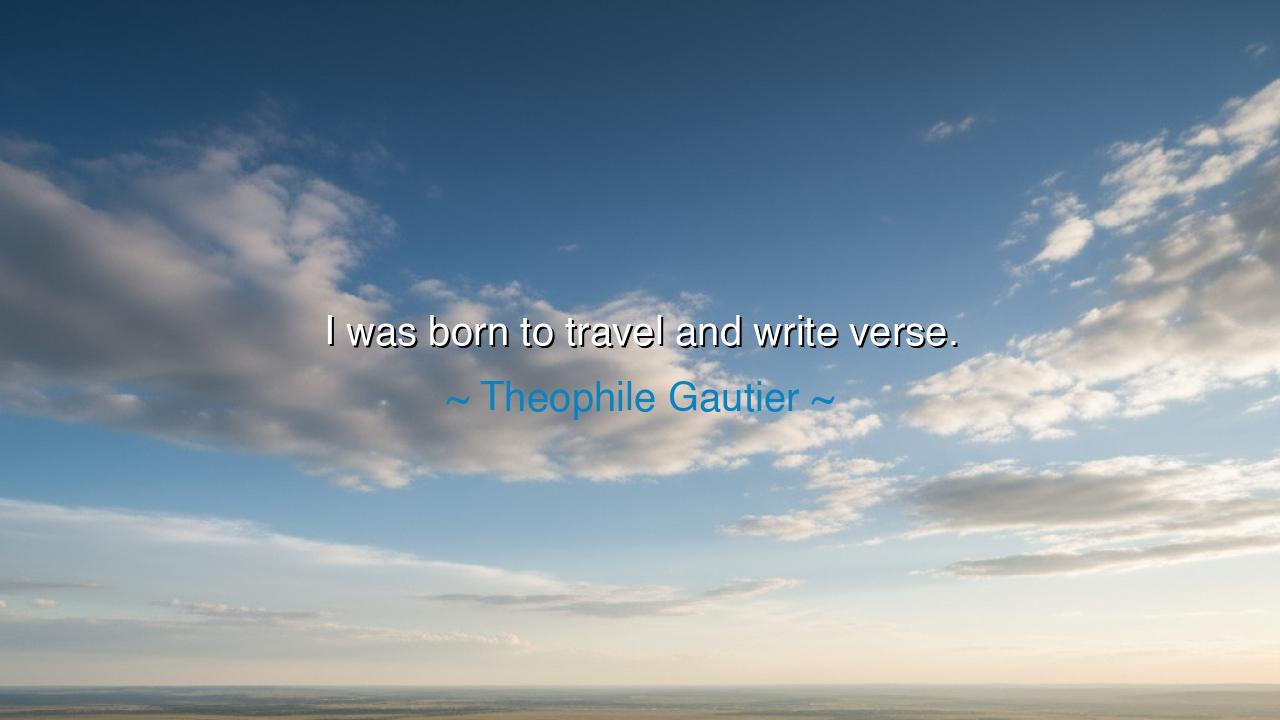
I was born to travel and write verse.






Hear, O seeker of wisdom, the bold and luminous words of Théophile Gautier, poet and wanderer of the Romantic age: “I was born to travel and write verse.” In this declaration we hear not modest reflection but the voice of destiny, the cry of a soul that knew its path from the first breath. Gautier, a man of 19th-century France, lived in a time when poets dreamed fiercely and artists sought to break free from chains of dull convention. His words are both confession and prophecy, revealing the essence of his being: a spirit woven of movement and music, forever seeking the road and the line of verse.
The heart of this saying is the union of travel and poetry. Travel is the body’s journey, the outward quest through mountains, rivers, and cities. Poetry is the soul’s journey, the inward shaping of beauty, rhythm, and truth. In binding the two, Gautier shows that the outer world and the inner world are mirrors, each awakening the other. To wander is to gather images and experiences; to write verse is to give those experiences eternal form. Thus, his life’s calling was not divided but singular: to move through the world as pilgrim and as poet, turning each road into song.
This wisdom echoes across ages. Consider the ancient poet Homer, whose words carried the voyages of Odysseus across the wine-dark sea. Homer himself may not have roamed, but his verse became a vessel of travel for generations. Or think of Marco Polo, whose journeys, when recorded, became a kind of poetry of discovery, igniting Europe’s imagination with visions of distant lands. Gautier stands within this lineage, knowing that the poet who travels doubles his power: he does not only dream but also witnesses, and he transforms the dust of the road into the immortal fire of art.
Gautier’s cry—“I was born”—is not to be dismissed as arrogance, but heard as the voice of vocation. Many live lives chosen by circumstance or bent by duty, but some souls awaken with a clear flame of purpose. For him, it was not commerce, nor power, nor science, but the call of wandering and the weaving of verse. The ancients called this daimon, the guiding spirit of destiny. To deny it was to suffer; to embrace it was to live fully. Thus Gautier’s life, by his own confession, was not merely chosen but ordained.
Yet there is also within his words the spirit of freedom. For both travel and poetry defy confinement. The traveler refuses to be rooted in one place, the poet refuses to be bound by silence. Both live by movement—the one across lands, the other across language. Gautier reminds us that the fullness of life is not in possession or security, but in the willingness to wander, to express, to risk oneself in pursuit of beauty. His statement is a rebuke to all who would live small, and a call to those who feel the stirrings of restlessness within their own hearts.
Consider the story of Lord Byron, another poet of the Romantic era, who fled England and spent his days roaming Europe, writing verse that burned with both passion and rebellion. Like Gautier, Byron seemed born to bind travel with poetry, as though the very landscapes he crossed demanded transformation into song. Their lives show us that the poet’s path is not only ink on paper but footprints on earth; the verse is written as much in movement as in words.
The lesson, then, is this: discover what you were born to do, and dare to live it without apology. If you are born to travel, travel. If you are born to write, write. If both flames burn in you, as in Gautier, then let them merge into one radiant fire. Do not hide behind the ordinary when your spirit was crafted for the extraordinary. The road may be uncertain, the verse may be fragile, but to walk and to speak in accordance with your nature is to live a life that echoes beyond time.
And in practice: seek both the outer journey and the inner expression. Walk through new lands with eyes open, and record not only what you see but what you feel. Write your verse, whether in poetry, story, or reflection, and let your words carry the memory of your travels. For as Gautier teaches, to travel and write verse is not only the path of poets—it is the eternal calling of all who long to transform life’s journey into lasting meaning.






AAdministratorAdministrator
Welcome, honored guests. Please leave a comment, we will respond soon